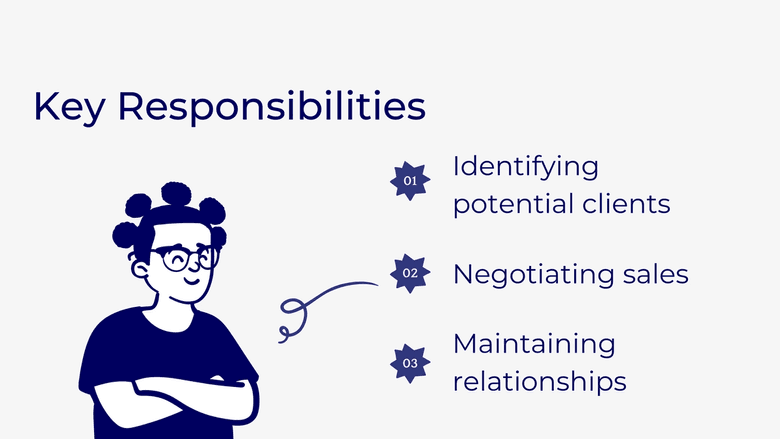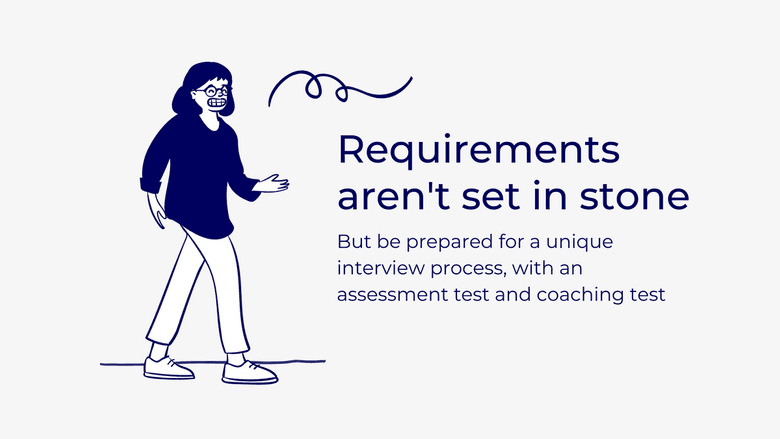Inside the Sales Representative Job
A thorough guide with inside information on working as a sales representative.
Sales representatives are becoming more and more in demand. The U.S. Bureau of Labor and Statistics even predicts that “a wider range of products and technologies will lead to increased demand for sales representatives.” What’s more, even with sales shifting to take place online more often than in person, sales technology is meant to complement face-to-face sales rather than replace them (including digital sales work).
With such a promising future, this field may be worth looking into. We'll tell you how to land a sales representative job, and what to expect when you do.
What Is A Sales Representative, Anyway?

Big picture-wise, sales representatives serve as a point of connection between manufacturers and their client organizations. The ultimate goal of sales representatives is to build valuable connections with clients in which they can continue to present and introduce company products.
There’s an important distinction to be made within the sales representative job. Some, though not all, companies will hire both outside and inside sales representatives.
- Outside sales reps travel regularly to connect with clients, making what are called "field sales." They also present and discuss quote costs, credit terms, and continue to maintain relationships with clients.
- Inside sales reps identify the clients outside sales representatives will eventually meet. The inside sales representatives also focus on small transactions and accounts, whereas outside sales representatives work on larger transactions. Additionally, those who are account executives will take on the specific responsibilities of managing accounts for transactions.
In companies that do not use outside sales representatives, all sales are done in-house. This means that the inside sales representatives handle all sales transactions from the comfort of their office. In another version of this combination, companies may use a mixed format, where sales representatives occasionally travel, but often handle clients from home. All in all, sales representatives have the same goals, regardless of their official titles as inside or outside sales representatives.
What Do Sales Representatives Do?

Though it is relatively variable, the role of a sales representative can be broken down into three parts: identifying potential clients, negotiating sales, and maintaining client-manufacturer relationships.
Identifying Potential Clients
A common practice is to assign certain sales representatives to specific geographic locations to work in, known as assigned territories. As mentioned, depending on their specific role, this does not always mean that they will travel to the assigned territory. If the sales representative is an outside sales representative, they will likely travel to make field sales. Otherwise most inside sales representatives will make cold calls, calls that act as the first point of contact to clients they have never before reached out to. This is also known as a form of telemarketing.
Negotiating Sales
Once contact is made, sales representatives will work hard to understand each client’s needs, delivering presentations and demonstrations on products. This stage is an ongoing process, as reps are expected to continue to follow up with clients.
Throughout this sales process, sales representatives use a variety of strategies and techniques. Most will follow a predetermined sales model and continually go through a sales training program. These experiences help newer reps build up sales experience and provide templates or useful techniques for connecting with clients.
As part of many company sales models, sales representatives use the technique of social selling to interact directly with clients. Along with using social media to attract and connect with clients, many sales reps gain valuable sales opportunities through Customer Relationship Management (CRM), technology that helps businesses manage how they interact with potential and current customers. CRM systems are usually used in collaboration within sales teams, often overseen by sales executives.
Maintaining Client-Manufacturer Relationships
Salespeople will often be tasked with evaluating client retention rate and customer acquisition rate. Client retention rate is the rate of clients the company has maintained relationships with, and customer acquisition rate is the rate at which sales representatives connect to or “acquire” customers. As mentioned before, the sales process is always evolving. It would probably be more accurate to call it the sales cycle, as representatives are constantly cycling through these stages.
Specific Responsibilities
Within these parts, specific duties and responsibilities will vary by company. For those interested in this role, the wide breadth of the responsibilities can seem daunting. Don’t give up yet though! It's rare that a single sales rep does everything outlined above. When broken down, job descriptions for sales representatives may involve the following responsibilities:
- Identify potential customers in assigned territories
- Establish relationships with clients
- Identify client needs
- Present and demonstrate possible products
- Follow-up with clients
- Evaluate retention
How Do I Get Hired As a Sales Representative?

Qualifications You'll Need
Education requirements can range from a high school diploma for some positions, to others that prefer those with bachelor’s degrees and above. According to the Bureau of Labor Statistics, a high school diploma is sufficient for most manufacturing sales positions. However, companies with technical and scientific products almost always prefer those with a bachelor’s degree. Those majoring in marketing or related degrees, as well as those with anywhere from a few months to 3 years of experience, will have a higher chance of acceptance.
Even if you don’t have direct sales experience, you still may be qualified. Companies appreciate those with any sort of persuasive and collaborative experience, such as those who have worked in customer service positions. Additionally, successful sales representatives have excellent communication skills and are great listeners, critical thinkers, and decision-makers.
What to Expect When Applying
The hiring process for sales representatives will usually include some of the following components:
- Application
- Phone screening
- Face-to-face interview
- Assessment test
- Coaching test
- Reference check
The application, phone-screening, and face-to-face interview follow pretty standard protocol. Keep general interview rules in mind, like communicating clearly and paying attention to detail. The reference check is also standard, and will go smoothly barring any rogue references. So the question remains: how do you tackle the assessment and coaching tests?
Assessment Test: Although the assessment test may seem daunting, in reality, it’s just another form of an interview. Depending on the company, it may be an extension of interview questions or take the form of a written test. Two questions that may be asked are:
- What is something you learned that will help you in this role?
- What is something you learned that has not helped you?
In these two questions, the company is trying to grasp how you can communicate your thoughts and how you view learning as a whole.
Coaching Test: A coaching test will usually follow the written test. In essence, the interviewer will take the responses to the interview (and maybe assessment) and do a live critique. Ultimately, the coaching test is the company’s way of gauging how you can take criticism.
Is It Worth the Effort?

This job requires a lot of concentrated effort, and getting there may seem like a daunting task. From a purely monetary standpoint, however, your efforts are likely to pay off.
Sales representatives are paid well, especially those in technological sectors. In 2018, the median annual salary of a sales representative in this industry was around $80,000, with the top 10% of all annual salaries beginning at around $160,000. It should be noted that earnings for sales representatives are from a combination of one’s salary and sales commissions which may vary. Regardless, it can be safe to say that most holding the job title of sales representatives will have sufficient opportunities for financial gain.
In addition to a solid salary, sales teams are highly valued. Companies will always appreciate those passionate about providing customers with the best possible experience. As demand for these roles continues to skyrocket, companies will try harder and harder to accommodate top talent. So, if this role sounds like a fit for you, why not apply to be a sales representative?
The information provided herein is for general informational purposes only and is not intended to provide tax, legal, or investment advice and should not be construed as an offer to sell, a solicitation of an offer to buy, or a recommendation of any security by Candor, its employees and affiliates, or any third-party. Any expressions of opinion or assumptions are for illustrative purposes only and are subject to change without notice. Past performance is not a guarantee of future results and the opinions presented herein should not be viewed as an indicator of future performance. Investing in securities involves risk. Loss of principal is possible.
Third-party data has been obtained from sources we believe to be reliable; however, its accuracy, completeness, or reliability cannot be guaranteed. Candor does not receive compensation to promote or discuss any particular Company; however, Candor, its employees and affiliates, and/or its clients may hold positions in securities of the Companies discussed.
